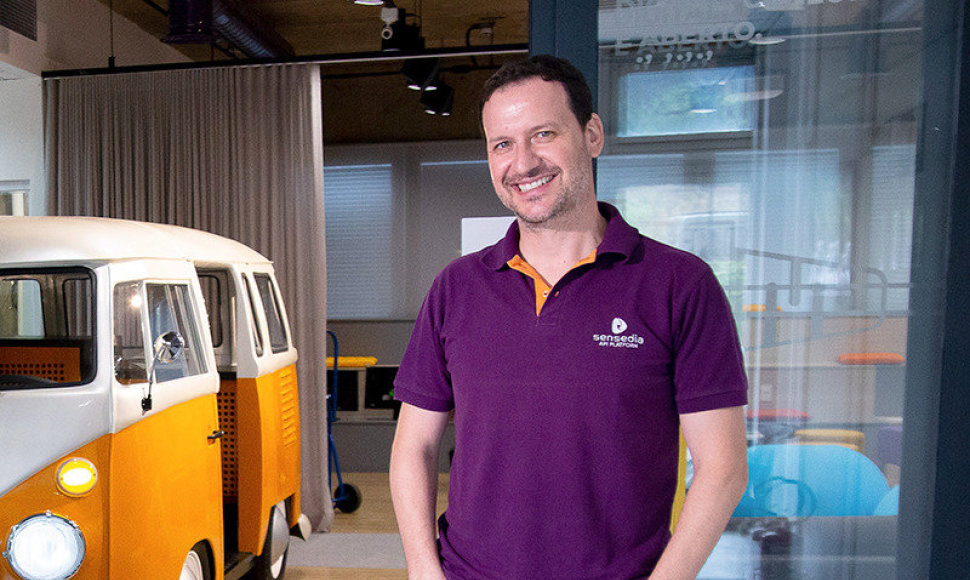Direction – open world
Based on traditional business models, the focus of organisations was mostly concentrated on in-house processes, which their departments worked on. These processes are usually separated from the IT section and create vast gaps in business development because a great deal of time has to be dedicated to the market launch of new and innovative solutions, leaving no time for minimal viable product testing, which would allow for a prompt examination of whether the idea is correct. Meanwhile, the open innovation model changes this logic, boosting businesses to a new stage where the focus is on open and active cooperation and the use of diverse information channels, transferring part of the innovation activities outside of the company by employing third-party solutions.
Organisations that choose to transition to an open innovation model are changing their thinking – the need arises to understand how to more effectively adapt and reorient one's product so that once it is integrated with other digital products, it would create the highest possible added value for the end-user. Open innovation as a method of creating innovation helps businesses discover new opportunities and reach new markets, allows them to reduce the risks of launching a new product, and find solutions most in line with the client's needs.
Less control – more uncertainty
Business strategies based on the open innovation business model will take just as many forms as the traditional business strategies have up until now. However, transitioning to openness simultaneously means transitioning to vast uncertainty. Leaders can no longer strictly define and control a company's future strategy and business model. Instead, they must adapt to the new reality – the future of business is almost unpredictable, and so every organisation must be able to constantly adapt and adjust its processes, ecosystems, and even core business strategies and mission. This is precisely why open digital services are so important – open business, based on well-planned IT services such as an open application programming interface (API), can change and adapt much faster and more effectively. Thus, when someone asks me what comes next, my answer is – you!
Transitioning to the open innovation model will greatly influence your business, and you will feel it either through your current competitors or through internal changes within your own organisation.
Digital maturity – a challenge
The need for IT modernisation is a challenge many organisations face right now. One of the most significant challenges organisations, looking to achieve a new level of digitalisation face, is tied to internal processes and digital maturity. The digital world must have a foundation – APIs, which form the basis for the digital strategies of contemporary organisations, play a key role in this. It is namely the API that prepares organisations for expanding the scope of operations of their business, increases the reliability of services provided, and ensures the monitoring of flows and consumption. APIs are the basis of any business-oriented toward developing innovations, having, among other things, already had a fundamental impact on the digital banking industry today and becoming the basis for new financial products.
Significant challenges also arise in product positioning. One of the core elements for businesses based on open digital services is the assurance of consistency – when services are offered on diverse digital channels, there is a need to ensure their equal effectiveness, speed, and transparency because this is exactly what could become a major part of one's competitive advantage. Those who effectively leverage APIs gain the advantage and the result depend on the third party developing these services – the supplier's experience. In this business model, the third-party is responsible for a positive customer experience, which also means it can properly position its services and gain a competitive advantage.
It is particularly important for organisations pursuing business goals to dedicate appropriate attention to information technologies, which could become the foundation of their business strategy. This is why choosing a reliable partner is crucial when transferring part of one's innovation activities beyond their business. The partner's core mission should be to help organisations overcome digital challenges. Considering how, in the future, the pace of business processes will accelerate even further from the generation of an idea to its realisation, there will also be growth in the eventually massive role of open innovation, accelerating business strategies and processes. So, what next? Your business, which must be prepared.
The author of this commentary is Kleber Bacili, the founder and head of Sensedia, an international company offering world-leading integrated IT solutions.












